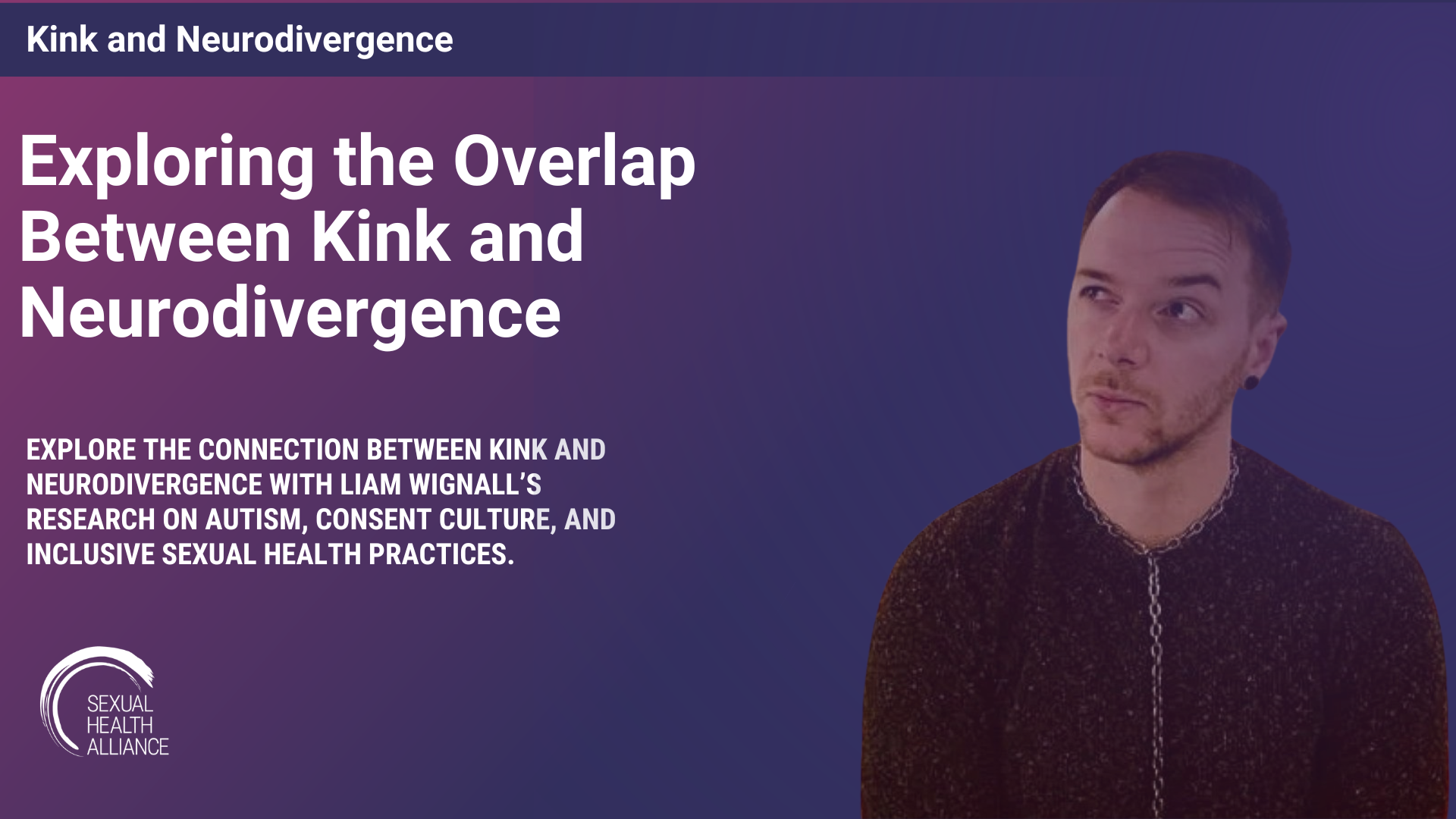The intersection of kink and neurodivergence is an underexplored but critical area of sexual health research and practice. In a recent Sexual Health Alliance conversation, Michelle Melville-Kashon, SHA’s Community and Content Director, sat down with Liam Wignall, Senior Lecturer in Psychology at the University of Brighton, whose decade-long research on BDSM and kink subcultures revealed a surprising and significant connection to neurodiversity—especially autism.
Liam’s work shows that kink communities may be uniquely supportive environments for neurodivergent individuals, offering clarity, structure, and acceptance often missing in mainstream sexual and social spaces.
Overview
Kink and neurodivergence intersect in meaningful ways that challenge stereotypes and expand our understanding of sexual diversity. Liam Wignall’s research indicates that 30–50% of individuals in certain kink communities display autistic traits, compared to 1–2% in the general population. This finding not only disrupts outdated notions that autistic people are asexual or uninterested in intimacy—it also suggests that kink environments, with their emphasis on clear communication, consent, and negotiated boundaries, can align closely with neurodivergent preferences.
For sexual health professionals, understanding this overlap is essential for inclusive, ethical practice. Incorporating neurodiversity-affirming approaches and collaborating directly with neurodivergent individuals can improve accessibility, reduce stigma, and promote sexual wellbeing.
High Prevalence of Autistic Traits in Kink Communities
Liam’s studies, including surveys using the Autism Spectrum Quotient (AQ), consistently show that a large percentage of kink community members—particularly in pup play—score high in autistic traits. This finding challenges the scarcity of academic attention given to neurodivergent sexuality and suggests that kink offers an environment where social rules are explicitly negotiated, reducing ambiguity.
Why Kink Appeals to Neurodivergent Individuals
Communication Clarity
Many autistic and otherwise neurodivergent people experience difficulty interpreting unspoken social cues. Kink scenes prioritize direct, explicit communication about limits, desires, and consent—creating a structure that can feel safer and more predictable.
Respect for Boundaries
The risk-aware consensual kink (RACK) framework encourages constant consent checks, which can reduce anxiety and rejection sensitivity by making it normal to express needs or discomfort without judgment.
Sensory Awareness
Some neurodivergent individuals experience heightened or unique sensory processing. Kink allows participants to tailor activities to their own sensory preferences, whether that means seeking certain sensations or avoiding overwhelming ones.
Confronting Stereotypes: Neurodivergent People Are Sexual Beings
Contrary to outdated stereotypes, autistic and neurodivergent people often desire intimacy and sexual connection. Mainstream portrayals, such as Netflix’s Love on the Spectrum, have helped challenge the myth of asexuality among autistic individuals, but much work remains. Recognizing and affirming neurodivergent sexual expression is critical for therapists, educators, and communities.
Inclusion Through Collaboration: “Nothing About Us Without Us”
Liam emphasizes the principle of “nothing about us without us”, advocating for neurodivergent involvement at every stage of research, program design, and service delivery. This means:
Consulting neurodivergent people on study design and survey language
Involving them in interpreting findings to avoid misrepresentation
Co-creating resources that reflect lived experiences
This collaborative model not only improves accuracy but also builds trust and relevance.
Practical Strategies for Professionals
Sexual health professionals can make simple yet powerful adjustments to improve accessibility for neurodivergent clients:
Provide materials in advance: Share interview questions, session outlines, or educational content before meetings
Offer multiple communication modes: Allow for virtual sessions, email exchanges, or in-person meetings based on preference
Be flexible with structure: Adjust pacing, environment, or session length to match the client’s needs
Use direct language: Avoid ambiguity and ensure instructions or feedback are clear and specific
Consent and Emotional Safety in Kink
Consent in kink is negotiated, ongoing, and flexible, allowing participants to change their minds at any point. This approach is especially beneficial for neurodivergent individuals, who may have fluctuating comfort levels or sensory responses during activities. Normalizing this fluidity helps reduce emotional distress and fosters mutual respect.
Bridging Research and Practice
At events like SHA’s Non-vanilla Weekend, Liam brings his research into practical focus, offering strategies for professionals to integrate neurodiversity awareness into sexual health services. These insights empower therapists, educators, and community leaders to create spaces where neurodivergent individuals can explore sexuality safely, confidently, and authentically.
Register for SHA events here to deepen your understanding of kink and neurodivergence.
Key Takeaways
Significant Overlap: 30–50% of some kink community members display autistic traits.
Communication Matters: Kink’s emphasis on clarity aligns with neurodivergent preferences.
Reject Stereotypes: Neurodivergent people often seek intimacy and sexual connection.
Collaborate: Involve neurodivergent voices in all aspects of research and practice.
Adapt Services: Small adjustments can make sexual health support more accessible.
Learn from Kink: Its consent culture offers lessons for mainstream sexual health.
People Also Ask: Kink and Neurodivergence
What does neurodivergence mean?
Neurodivergence refers to differences in brain functioning, including autism, ADHD, dyspraxia, dyslexia, and more. It’s not a disorder to be “fixed” but a natural variation in human cognition.
Why is there a high rate of autistic traits in kink communities?
Research suggests that kink’s structured communication, explicit boundaries, and acceptance of diversity align well with the preferences and needs of many neurodivergent individuals.
How can professionals make kink spaces more accessible for neurodivergent people?
Offer clear instructions, reduce sensory overload, provide consent negotiations in writing, and be flexible with communication formats.
Do neurodivergent people want sexual relationships?
Yes. Many autistic and neurodivergent people desire intimacy, connection, and sexual expression, though they may navigate these differently due to social or sensory factors.
Want to become an in-demand sexual health professional? Learn more about becoming certified with SHA!




